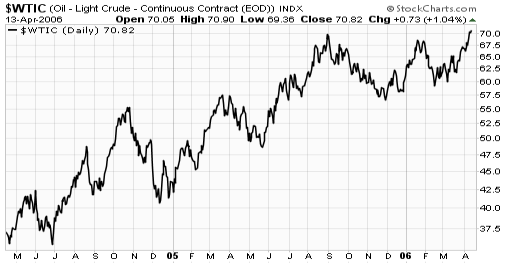| Home | About Us | Resources | Archive | Free Reports | Market Window |
A Landmark Piece of NewsBy
Monday, April 17, 2006
Four years ago, as my family sat around the Christmas tree and opened presents, we counted how many items had “Made in China” printed on them. The final tally? 34 out of 36! Now, counting the “Made in China” tags has become a bit of a tradition with us. We do it every year now and the results are always the same... everything comes from China. China has dominated the market for about 10 years now. Economists call it the “Golden Era” of Chinese manufacturing. They say Vietnam will be the next low-cost producer. Chris Mayer – a great investor and writer I know from my old job at the Daily Reckoning – says the last time he was in China, he heard the Chinese talk about Vietnam like Americans talk about Mexico. He says wages in Vietnam are even lower than they are in China. I think Vietnam could be a very smart investment for the future. Thing is, I’m digressing. I think there’s evidence here of a much bigger change in the works. The job migration from China to Vietnam is just one of the clues... I’m talking about the price of simple manufactured goods. I think they’re about to get more expensive – not just for America, but for everyone in the world – and this will send major ripples through the financial markets. Let’s use a beach ball maker in China as an example. The major expenses are energy for transport, electricity for the plant, and plastics for the beach balls. Then you’ve got the fixed costs: wages, rent and machinery. In the last few years, energy and material costs have risen fast. None of this will come to you as much of a surprise... But wages? This is China’s edge... and the reason beach balls will always be so cheap. With an endless supply of labor, wages can never rise. At least, that’s what everyone thought... A recent article in the New York Times blew this idea wide open. It was a landmark piece of news: “Persistent labor shortages at hundreds of Chinese factories” says the headline. “Wage levels throughout China's manufacturing ranks are rising, threatening at some point to weaken China's competitiveness on world markets.” According to government officials, factories in Guangdong Province were short more than 500,000 workers this year. In Fujian Province, there was a shortage of 300,000. Zhejiang Province is short 200,000 to 300,000 workers. Minimum wages have climbed about 25 percent over the past three years in big cities, says the government. Wages at larger factories operated on behalf of multinationals are also on the rise. The bottom line is this: If wages rise in China, then prices rise in China. The rising price of Chinese goods is bad news for CPI indices around the world. We all know inflation is rising. I see it everyday when I buy groceries. But official government stats don’t reflect this. Chinese labor is the big reason. The prices economists study have – until now – been kept low by cheap Chinese labor. Now wages and other costs are rising in China, economists won’t be able to hide inflation. When this news hits the headlines, investors will find bonds a lot less attractive. Result: China makes less money and investors worry about inflation. My colleague Steve Sjuggerud disagrees with me, but I think it’s the perfect set up for a rise in long-term interest rates all around the world. If you agree, buy the Profunds Rising Rates Opportunity Fund (RRPIX) to take advantage... Good Investing, Tom Market Notes
NEW HIGHS OF NOTE LAST WEEK
Silver, Gold, Copper, Crude Oil BHP Billiton (BHP)… world’s largest commodity producer Teck Cominico (TEK.SB.TO)… copper and zinc mining Nomura Holdings (NMR)… Japan’s leading brokerage Transocean (RIG)… deep water oil drilling Joy Global (JOYG)… construction and mining equipment Nokia (NOK)… cell phones Deutsche Bank Commodity Tracking Index (DBC)... commodity ETF iShares Hong Kong Index Fund (EWH)… Chinese stocks run higher Crystallex (KRY)...John Doody gold stock pick, up 172% in 2006 Gold Reserve (GRZ)... John Doody gold stock pick, up 165% in 2006 Yamana Gold (AUY)… John Doody gold stock pick, up 55% in 2006. NEW LOWS OF NOTE LAST WEEK New High of Special Note: After crude oil reached a hurricane-inspired high of $70 a barrel in late 2005, many people thought the bull market in energy was over. They were wrong. Supply is tight. Demand is strong. Crude is breaking to new highs, and the bull market in oil continues… The past 2 years in crude oil:
|
Recent Articles
|


